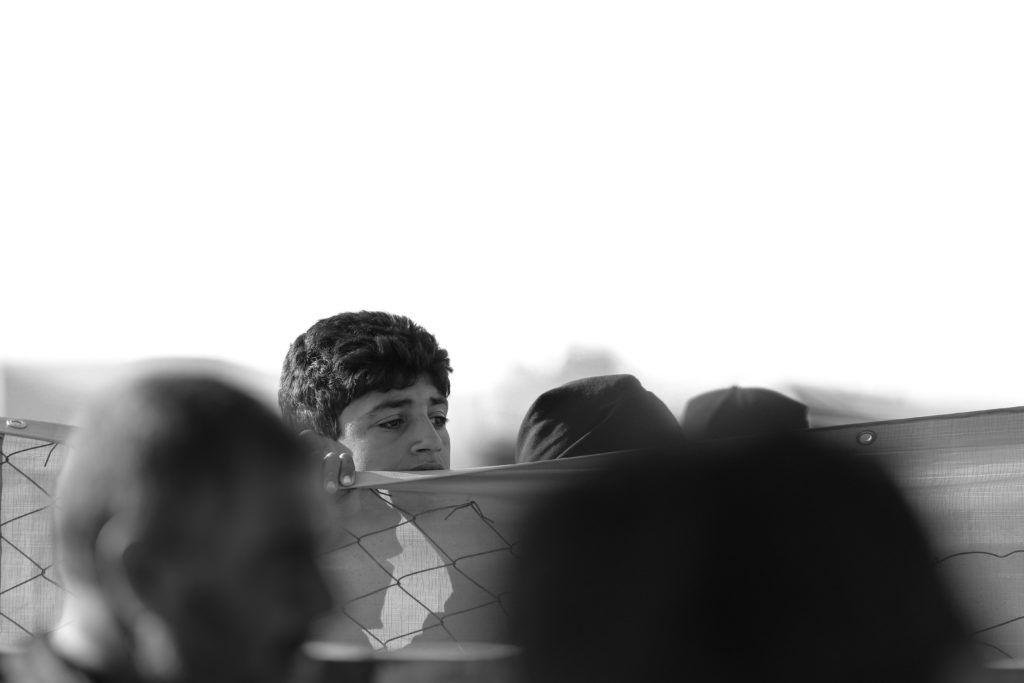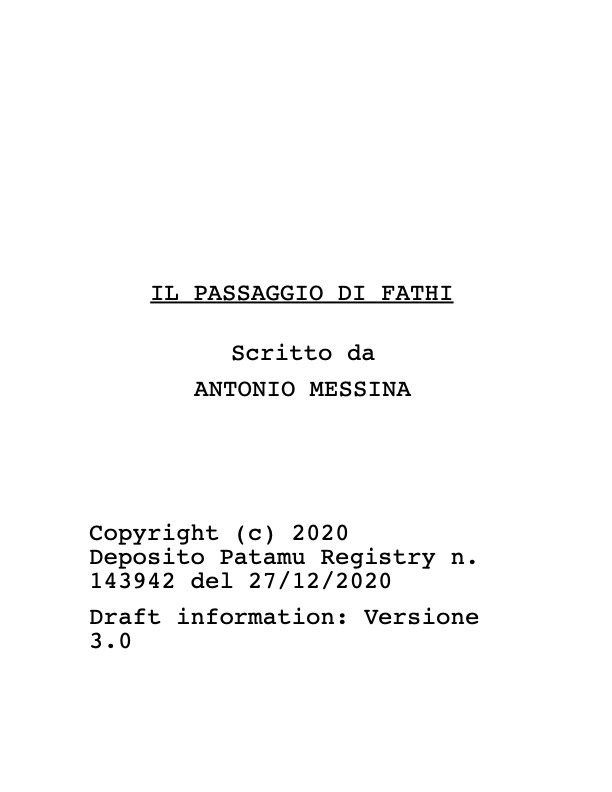The passage of Fathi
Feature film (r. 03 – 111 pages)
Drama
Text in Italian
Characters: 2 main characters (36 with at least one line of dialogue, 10 with lines in at least five scenes).
Locations: 53 total (13 used in at least 3 scenes)
Period: present days (around 2020)
Locations of the story: Ancona. Some scenes in a mountainous area imagined to be on the border between Greece and Bulgaria.
Legal deposit: Patamu Registry
For contacts, please fill in the form
Prizes
First prize:
Milan Gold Awards (2022 Agosto).
Semifinalist:
Florence Film Awards (2022 Settembre); Premio Letterario Nazionale Città di Ascoli Piceno (2022).
Nomination:
Rome Prisma Film Award (2023).
Selected:
Milan Film Fest International (2023).
Synopsis
Andrea is a nurse at the hospital in Ancona, Cristina works part time as a cashier, their son Tommaso is ten years old and plays football.
The supermarket manager informs Cristina that he will not give her a full time contract because he has hired a Nigerian woman with a crippled arm to whom Cristina will have to teach the job.
When the hospital pay arrears, Andrea triumphantly announces that the family will be able to take a week’s holiday. The destination of the trip is an inland region of Greece.
On the last day of their holiday, the family embarks on a hike along a path that, on one side, is bordered by a high fence topped with barbed wire. When they return, beyond the fence they see a group of refugees. Among them are Yusuf and little Fathi. Military personnel arrive and disperse the group. In the excitement, Yusuf makes a sudden decision: before fleeing with the others, he throws Fathi into Andrea’s arms.
Andrea convinces Cristina to embark with Fathi and then hand him over to social services. The next day, the head of Ancona’s Social Services decides to contact the Questura before taking charge of Fathi’s case. Fathi, in the meantime, will stay with Andrea and Cristina.
At the meeting at the Questura, Commissioner Leonardi explains the difficulty of legally framing Fathi’s case, adding that Andrea and Cristina could be classified as kidnappers of the child. In the following days it is learnt that Fathi is Syrian. The child confirms Andrea and Cristina’s account and says that his father has promised to come back for him.
Fathi’s presence entails commitments and some extra expenses and Tommaso is not enrolled in the football school.
In a second meeting at the Questura, the social worker points out that Fathi’s fate will be different depending on his age: if he is up to seven years old he will have to go to a family-type community, if he is older he can go to a foster home. While efforts are made to ascribe an age to Fathi, the child will remain with Andrea and Cristina.
A meeting at the court leads to the decision to consult the Juvenile Commission. After a few days, the honorary judge announces that Fathi will be recognised as an unaccompanied minor but, as the procedure will take some time, he proposes to Andrea and Cristina that they take Fathi into their care for a period that could range from six months to a year, with a financial contribution. Andrea and Cristina agree.
Andrea adds and moves furniture in Tommaso’s room to accommodate Fathi during the foster care period. Tommaso reacts badly and Cristina tries to console him. A few days later, Andrea promises Tommaso that he will enrol him in football school as soon as the foster care contribution money arrives.
Cristina learns with dismay that, at school, the language mediator will work alongside Fathi for no more than ten hours during the whole school year. Back home after shopping, Cristina points out and names to Fathi the things she has bought.
At dinner Tommaso hoards the food. Andrea scolds him, Cristina gives some of her share to Fathi. Tommaso notices the attention and cries. Cristina goes to console him.
Fiddling with expenses and bills, Cristina argues with Andrea because he has not taken an interest in knowing when the foster care contribution money will arrive.
To replace the missing children Tommaso and Fathi take part in a school football match. Tommaso’s team fields Fathi in goal and also loses because of his inexperience.
Cristina and Andrea are divided on what attitude to take towards Tommaso. A few days later, they accompany the two children to play in a park and try to talk more calmly, but without really getting closer.
As the foster care period nears its end, the honorary judge summons Andrea and Cristina and asks them to consider adopting Fathi.
Each occasion highlights to Andrea and Cristina the difficulties of their situation, including economic ones. Andrea confirms to Cristina that the possible adoption, unlike fostering, will not benefit from financial contributions.
A trivial quarrel highlights the rift that is widening between Andrea and Cristina, with Andrea more open to adoption and Cristina more sensitive to Tommaso’s desire to return to being the sole beneficiary of his parents’ affection.
Andrea proposes to Cristina to undergo couples therapy. From the first session it emerges that the decision whether or not to adopt Fathi is a decisive junction.
The honorary judge informs Andrea and Cristina that another couple, Mr. and Mrs. Santoni, would be willing to adopt Fathi, so he needs Andrea and Cristina to make a decision and communicate it to the court.
When they confront each other after the meeting, Andrea expresses some misgivings about Mrs Santoni, Cristina points out that the woman does not work and could devote time and attention to Fathi that the two of them are unable to provide because of their respective jobs, characterised by irregular hours and, in Andrea’s case, also night shifts.
Yusuf arrives in Italy and tracks down Andrea and Cristina’s address. He then goes to Ancona and gets on the bus with which Tommaso and Fathi are going to school.
Yusuf, accompanied by his friend Ziyad, forces Andrea to take Fathi away immediately.
Family life resumes without Fathi. The foster care contribution money arrives; Tommaso returns to the football school; the camper is demolished; Cristina and Andrea try to heal the wounds of their relationship.


